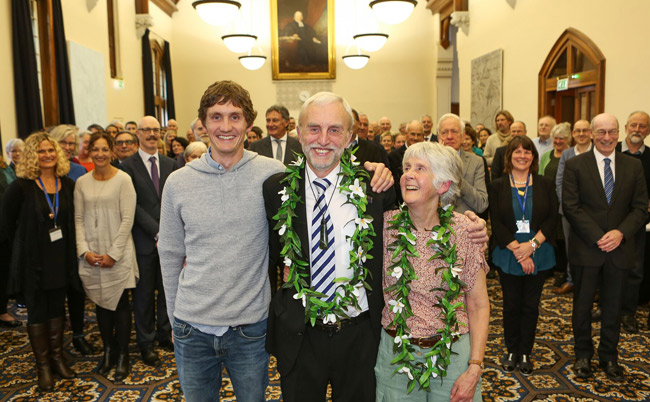Tuesday 30 April 2019 10:32pm

A fitting send-off... Professor Vernon Squire (centre) with his wife Professor Pat Langhorne and son Dr Jonathan Squire during Professor Squire's retirement function at the Clocktower on Monday evening. Photo: Sharron Bennett.
When Professor Vernon Squire arrived at Otago in 1987 to take up the position of Professor of Applied Mathematics, he brought with him an open mind.
“I do recall thinking I would just stay five years if I got the job, and if it didn’t work out, we could always move back to Cambridge,” he reflects.
The good news is it did all work out, and now at the end of an illustrious career spanning 32 years, Professor Squire celebrated his retirement this week with colleagues and friends.
It was the welcoming community and progressive childcare policies that both Professor Squire and his wife Professor Pat Langhorne agree stood out when they first arrived at Otago.
And now reflecting on his last three decades at the University, Professor Squire sums it up: “I could never dream of how my career has progressed in the way it has, and where it has taken me.”
"With each role I sought new challenges, but the primary reason I chose to move into these positions was because I could still undertake my research and teaching which is pivotal to who I am."
Over this period, Professor Squire has held a number of positions including Head of Department of Mathematics and Statistics, Pro-Vice-Chancellor (Sciences), and since 2010 he has held the role of Deputy Vice-Chancellor (Academic).
“With each role I sought new challenges, but the primary reason I chose to move into these positions was because I could still undertake my research and teaching which is pivotal to who I am.”
It’s a university model that is unique in New Zealand and an approach that Professor Squire believes has proven successful.
“Having academics in senior executive roles means not only do they understand the pressures associated with research, teaching and service, but they also continue to be active in those spaces and actively contribute to the Performance Based Research Fund evaluation.”
However it was Otago’s proximity to Antarctica that was the initial drawcard for the couple, whose research interests both focus on polar sea ice.
Professor Squire’s research has specialised in mathematical modelling in marine science, particularly the interaction between sea-ice and ocean dynamics.
It’s this combination of applying mathematics to environmental interests that has been the hallmark of his research interests.
“With maths it’s spine-tingling when a light bulb moment of actually understanding something totally occurs,” Professor Squire describes. “It’s very empowering and a real motivator for moving forward with research.”
"There was a spectacular resurgence of interest in the subject ... I have continued to be invited frequently to give plenary speaking engagements at influential polar science conferences around the world."
At a ceremony in Buckingham Palace in 1988, Professor Squire was awarded the Polar Medal with Antarctic and Arctic Clasp, and through his career has made over 25 field trips to the polar regions.
“Up to about the year 2000, my research was generally regarded as important but possibly a little too mathematical and obscure for mainstream polar science, as I was making more elaborate theories that were a better fit with reality,” Professor Squire says.
But it was the rapid reduction in the Arctic sea ice cover over the past 30 years and its vital connection to global climate change that launched his theoretical yet prescient research into the limelight.
“There was a spectacular resurgence of interest in the subject and, as a specialist in the interaction of waves on sea ice, I have continued to be invited frequently to give plenary speaking engagements at influential polar science conferences around the world.”
In 2017 Professor Squire spent two months as a Simons Fellow at the University of Cambridge’s Isaac-Newton Institute, where he collaborated and shared ideas with world leading researchers on the mathematics of sea ice.
Right on cue with his retirement, Professor Squire is putting the final touches to a review paper he was invited to write on the subject of ocean wave interactions with sea ice, for the prestigious Annual Reviews series.
It’s a fitting tribute to a researcher who has dedicated a big part of his career to advancing knowledge in this area. Not only will the document be a blueprint for future researchers, but its publication will be a perfect academic swansong for a much gifted and respected member of the Otago community.
